I am trying to extend Django's user model as per
https://docs.djangoproject.com/en/1.9/topics/auth/customizing/
Now i can add a new field that i want to be associated with each user. But the problem is, i cannot add a non-admin user. If i add a user and dont make them the admin, then the login fails
but if i log in as any admin user, i clearly see
Why is my application only allowing admins to log in? Do i have to create a separate login screen for non admin users?
here is my models.py
from django.db import models
from django.contrib.auth.models import (
User, BaseUserManager, AbstractBaseUser
)
'''
class UserProfile(models.Model):
appcodes = models.TextField()
user = models.ForeignKey(User, unique=True)
'''
class AppCodeUserManager(BaseUserManager):
def create_user(self, email, appcode, password=None):
"""
Creates and saves a User with the given email, appcode and password.
"""
if not email:
raise ValueError('Users must have an email address')
user = self.model(
email=self.normalize_email(email),
appcodes=appcode
)
user.set_password(password)
user.save(using=self._db)
return user
def create_superuser(self, email, appcode, password):
"""
Creates and saves a superuser with the given email, appcode and password.
"""
print("Creating superuser...")
user = self.create_user(email,
password=password,
appcodes=appcode
)
user.is_admin = True
user.save(using=self._db)
return user
class AppCode(models.Model):
appcode_name = models.CharField(max_length=255,unique=True)
class AppCodeUser(AbstractBaseUser):
email = models.EmailField(
verbose_name='email address',
max_length=255,
unique=True,
)
appcodes = models.TextField()#CharField(max_length=255,unique=True,default="RIK0")#models.ManyToManyField(AppCode)
is_active = models.BooleanField(default=True)
is_admin = models.BooleanField(default=False)
objects = AppCodeUserManager()
USERNAME_FIELD = 'email'
REQUIRED_FIELDS = ['appcodes']
def get_appcodes(self):
return ", ".join([p.appcode_name for p in self.appcodes.all()])
get_appcodes.short_description = 'Appcodes'
get_appcodes.allow_tags = True
def get_full_name(self):
# The user is identified by their email address
return self.email
def get_short_name(self):
# The user is identified by their email address
return self.email
def __str__(self): # __unicode__ on Python 2
return self.email
def has_perm(self, perm, obj=None):
"Does the user have a specific permission?"
# Simplest possible answer: Yes, always
return True
def has_module_perms(self, app_label):
"Does the user have permissions to view the app `app_label`?"
# Simplest possible answer: Yes, always
return True
@property
def is_staff(self):
"Is the user a member of staff?"
# Simplest possible answer: All admins are staff
return self.is_admin
all i want to do is add a TextField() for each user. This field will be named appcodes
and here is my admin.py
from django import forms
from django.contrib import admin
from django.contrib.auth.models import Group
from django.contrib.auth.admin import UserAdmin as BaseUserAdmin
from django.contrib.auth.forms import ReadOnlyPasswordHashField
from .models import AppCodeUser
class UserCreationForm(forms.ModelForm):
"""A form for creating new users. Includes all the required
fields, plus a repeated password."""
password1 = forms.CharField(label='Password', widget=forms.PasswordInput)
password2 = forms.CharField(label='Password confirmation', widget=forms.PasswordInput)
appcodes=forms.TextInput
class Meta:
model = AppCodeUser
fields = ('email', 'appcodes')
def clean_password2(self):
# Check that the two password entries match
password1 = self.cleaned_data.get("password1")
password2 = self.cleaned_data.get("password2")
if password1 and password2 and password1 != password2:
raise forms.ValidationError("Passwords don't match")
return password2
def save(self, commit=True):
# Save the provided password in hashed format
user = super(UserCreationForm, self).save(commit=False)
user.set_password(self.cleaned_data["password1"])
if commit:
user.save()
return user
class UserChangeForm(forms.ModelForm):
"""A form for updating users. Includes all the fields on
the user, but replaces the password field with admin's
password hash display field.
"""
password = ReadOnlyPasswordHashField()
class Meta:
model = AppCodeUser
fields = ('email', 'password', 'appcodes', 'is_active', 'is_admin')
def clean_password(self):
# Regardless of what the user provides, return the initial value.
# This is done here, rather than on the field, because the
# field does not have access to the initial value
return self.initial["password"]
class UserAdmin(BaseUserAdmin):
# The forms to add and change user instances
form = UserChangeForm
add_form = UserCreationForm
# The fields to be used in displaying the User model.
# These override the definitions on the base UserAdmin
# that reference specific fields on auth.User.
list_display = ('email','appcodes','is_admin','is_active')
list_filter = ('is_admin',)
fieldsets = (
(None, {'fields': ('email', 'password')}),
('Appcode info', {'fields': ('appcodes',)}),
('Permissions', {'fields': ('is_admin',)}),
)
# add_fieldsets is not a standard ModelAdmin attribute. UserAdmin
# overrides get_fieldsets to use this attribute when creating a user.
add_fieldsets = (
(None, {
'classes': ('wide',),
'fields': ('email', 'appcodes', 'password1', 'password2')}
),
)
search_fields = ('email',)
ordering = ('email',)
filter_horizontal = ()
# Now register the new UserAdmin...
admin.site.register(AppCodeUser, UserAdmin)
# ... and, since we're not using Django's built-in permissions,
# unregister the Group model from admin.
admin.site.unregister(Group)
and in my settings.py i have
INSTALLED_APPS = [
'django.contrib.admin',
'django.contrib.auth',
'django.contrib.contenttypes',
'django.contrib.sessions',
'django.contrib.messages',
'django.contrib.staticfiles',
'hdfsStats.apps.HdfsstatsConfig',
]
MIDDLEWARE_CLASSES = [
'django.middleware.security.SecurityMiddleware',
'django.contrib.sessions.middleware.SessionMiddleware',
'django.middleware.common.CommonMiddleware',
'django.middleware.csrf.CsrfViewMiddleware',
'django.contrib.auth.middleware.AuthenticationMiddleware',
'django.contrib.auth.middleware.SessionAuthenticationMiddleware',
'django.contrib.messages.middleware.MessageMiddleware',
'django.middleware.clickjacking.XFrameOptionsMiddleware',
]
AUTH_USER_MODEL = 'hdfsStats.AppCodeUser'
rest are default values i guess

